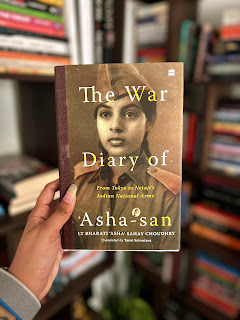My Rating - 4 out of 5 stars
Publisher - Harper CollinsGenre - Memoir
Publishing year - 2022
Language - English
ISBN - 978-93-5629-140-9
Pages - 225
The War Diary of Asha-san is a remarkable Japanese memoir written by Bharati 'Asha' Sahay Choudhary during the Second World War and then translated into Hindi. Asha's granddaughter-in-law, Tanvi Srivastava, rephrased it into English, and that's the version I read.
Asha's father, Anand Mohan Sahay, was a freedom fighter and a revolutionary living in Japan with his family. He worked closely with Netaji Subhas Chandra Bose. He instilled the same patriotic feeling in his children, leading to Asha's joining the Rani of Jhansi Regiment (RJR), an all-female unit of the Indian National Army (INA), after meeting Bose in Japan in 1943 when she was only seventeen years old.
The book is divided into three parts, covering different stages of Bharati's journey. The first part, set in war-torn Tokyo, introduces the reader to the Sahay family, their close association with Bose, and how she joined RJR.
In the book's second part, Bharati and her fellow soldiers are trained in military tactics and weapons in Thailand. The author's description of her training and the daily life of the soldiers is vivid and engaging. Bharati's diary entries reveal her thoughts, emotions, and anxieties as she undergoes rigorous training and prepares for battle.
The book's third part covers the last leg of her journey to India, visiting her long-lost relatives and learning about Indian culture, language, and traditions. She briefly shares the experiences of her father and uncle being in jail and her mother alone in Japan with her siblings.
Lt Bharati 'Asha' Sahay's diary entries reveal her courage and determination in adversity. She also writes about her comrades and the camaraderie that develops among them as they fight for a common cause, independence. In addition, she expresses her self-doubt by stating that she did not achieve as much as her father and uncle.
What makes this book unique is its perspective on the Indian independence movement from the point of view of a young woman who was part of the armed struggle. The author's writing is straightforward, honest, and direct, and the entries provide a personal and intimate insight into her psyche.
The translator, Tanvi Srivastava, has done an excellent job of rendering the Hindi text into English, and the book reads smoothly. Overall, it is a compelling memoir that sheds light on a lesser-known aspect of the Indian independence movement. The author's courage and love for India are inspiring, and her story deserves to be read and remembered.
The book will appeal to anyone interested in Indian history, military history, or individual bravery and perseverance memoirs.






No comments:
Post a Comment